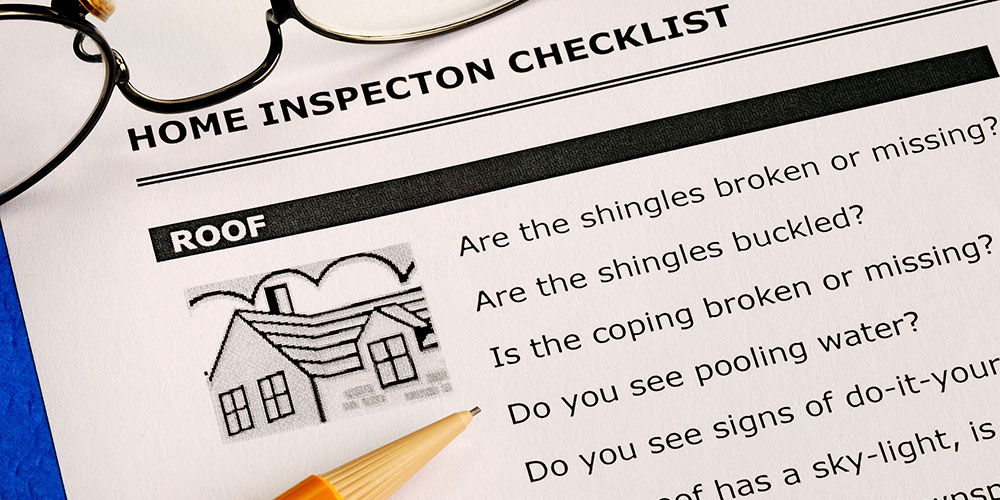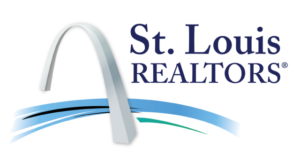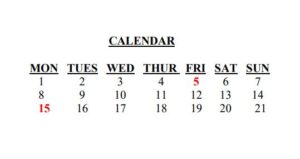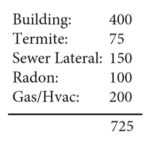
07 May Need a Home Inspection In St. Louis?
Typically within 10 days of the final acceptance of the contract the buyer will come over to the home with their inspector. Depending on how thorough they are, they will look over the whole property, take photos of different things, test every outlet for grounding, check the water heater/furnace for gas leaks, make notes about anything they find in the attic, and on and on.
The inspector will then go back to their office, and likely the next day, present a 30ish page report to the buyer and their REALTOR®. The buyer will sit down with their REALTOR® and discuss what repairs they want to request from the seller.
Does the buyer want the seller to fix something? Will the buyer require repairs be done by a licensed contractor and the seller will have to produce invoices? Does the buyer want the seller to just give them money? Will the buyer say, “Everything’s great”, and not request anything? Or will the buyer say, “I saw something I don’t like and I’m running away. Let me out of this deal!!”
A lot of deals fall through at inspection, which is why it is smart to wait until after the inspection contingency is resolved to order a gas inspection and to order the municipal inspection. Once the buyer submits the Inspection Notice with their requests, the seller then usually has 10 days to think it over, get any contractors out to the house to get bids on the work they want done, and get back to the buyer about what repairs they are willing to do.
The seller is allowed to counter the buyer’s requests. One example is to offer some money and a home warranty instead of making repairs. When the buyer and seller come to an agreement, then the inspection contingency is resolved. At this point the only thing that is holding the buyer back from buying the home is that it appraises for a high enough amount and that their lender will still approve them. Because the buyer is already pre-approved, the seller will just have to assume they will not walk away for financing purposes. It is at this point that it is okay for the seller to order the gas inspection and the municipal inspection.

A home inspector will have a long list of inspections to choose from with a price for each one. Choose as many inspections as it takes to feel comfortable with the home. Here are some examples.
•Asbestos
•Chemicals and gases
•Chimney
•Disaster
•Documents
•Electrical
•Fireplace
•Foundation
•Gas lines/fuel runs
•Heating and air conditioning (HVAC)
•In-ground sprinkler
•Landscaping
•Lead
•Mold
•Pond and lakes
•Pool and spa
The following frequently asked questions are taken directly from the American Society of Home Inspectors’ website, www.homeinspector.org . ASHI is THE trusted source when it comes to home inspections.
Since 1976, the American Society of Home Inspectors (ASHI) has worked to build consumer awareness of home inspection and to enhance the professionalism of its membership. The ASHI Standards of Practice and Code of Ethics serves as a performance guideline for home inspectors, and is universally recognized and accepted by many professional and governmental bodies.
What does a home inspection include?
The standard home inspector’s report will cover the condition of the home’s heating system; central air conditioning system (temperature permitting); interior plumbing and electrical systems; the roof, attic and visible insulation; walls, ceilings, floors, windows and doors; the foundation, basement and structural components.
The American Society of Home Inspectors (ASHI) publishes a Standards of Practice and Code of Ethics that outlines what you should expect to be covered in your home inspection report.
Why do I need a home inspection?
Buying a home could be the largest single investment you will ever make. To minimize unpleasant surprises and unexpected difficulties, you’ll want to learn as much as you can about the newly constructed or existing house before you buy it. A home inspection may identify the need for major repairs or builder oversights, as well as the need for maintenance to keep it in good shape. After the inspection, you will know more about the house, which will allow you to make decisions with confidence.
If you already are a homeowner, a home inspection can identify problems in the making and suggest preventive measures that might help you avoid costly future repairs.
If you are planning to sell your home, a home inspection can give you the opportunity to make repairs that will put the house in better selling condition.\
What will it cost?
The inspection fee for a typical one-family house varies geographically, as does the cost of housing. Similarly, within a given area, the inspection fee may vary depending on a number of factors such as the size of the house, its age and possible optional services such as septic, well or radon testing.
Do not let cost be a factor in deciding whether or not to have a home inspection or in the selection of your home inspector. The sense of security and knowledge gained from an inspection is well worth the cost, and the lowest-priced inspection is not necessarily a bargain. Use the inspector’s qualifications, including experience, training, compliance with your state’s regulations, if any, and professional affiliations as a guide.
Why can’t I do it myself?
Even the most experienced homeowner lacks the knowledge and expertise of a professional home inspector. An inspector is familiar with the elements of home construction, proper installation, maintenance and home safety. He or she knows how the home’s systems and components are intended to function together, as well as why they fail.
Above all, most buyers find it difficult to remain completely objective and unemotional about the house they really want, and this may have an effect on their judgment. For accurate information, it is best to obtain an impartial, third-party opinion by a professional in the field of home inspection.
Can a house fail a home inspection?
No. A professional home inspection is an examination of the current condition of a house. It is not an appraisal, which determines market value. It is not a municipal inspection, which verifies local code compliance. A home inspector, therefore, will not pass or fail a house, but rather describe its physical condition and indicate what components and systems may need major repair or replacement.
How do I find a home inspector?
You can ask friends or business acquaintances to recommend a home inspector they have used. Or, you can use the Find An Inspector search tool for a list of home inspectors in your area who belong to the non-profit professional organization. To have a list mailed to you, call 1-800-743-ASHI (2744). Also, real estate agents and brokers are familiar with the service and may be able to provide you with a list of names from which to choose.
Whatever your referral source, you can be assured of your home inspector’s commitment to professional standards and business ethics by choosing one who has membership in ASHI.
Who belongs to ASHI?
ASHI is an organization of independent, professional home inspectors who are required to make a commitment, from the day they join as ASHI Associates, to conduct inspections in accordance with the ASHI Standards of Practice and Code of Ethics, which prohibits engaging in conflict-of-interest activities that might compromise their objectivity. ASHI Associates work their way to ASHI Certified Inspector status as they meet rigorous requirements, including passing a comprehensive, written technical exam and performing a minimum of 250 professional, fee-paid home inspections conducted in accordance with the ASHI Standards of Practice and Code of Ethics. Mandatory continuing education helps the membership stay current with the latest in technology, materials and professional skills.
When do I call a home inspector?
Typically, a home inspector is contacted immediately after the contract or purchase agreement has been signed. Before you sign, be sure there is an inspection clause in the sales contract, making your final purchase obligation contingent on the findings of a professional home inspection. This clause should specify the terms and conditions to which both the buyer and seller are obligated.
Do I have to be there?
While it’s not required that you be present for the inspection, it is highly recommended. You will be able to observe the inspector and ask questions as you learn about the condition of the home and how to maintain it.
What if the report reveals problems?
No house is perfect. If the inspector identifies problems, it doesn’t mean you should or shouldn’t buy the house, only that you will know in advance what to expect. If your budget is tight, or if you don’t want to become involved in future repair work, this information will be important to you. If major problems are found, a seller may agree to make repairs.
If the house proves to be in good condition, did I really need an inspection?
Definitely. Now you can complete your home purchase with confidence. You’ll have learned many things about your new home from the inspector’s written report, and will have that information for future reference.

Below is an example of a legal document specifically talking about inspections that St. Louis REALTORS® provides its REALTORS®. Forms like this get updated all the time so don’t use it as your own legal document. This is just an example.
Note: Please be advised that this brochure is not a contract, does not replace the contractual provisions and is not a legal interpretation of the contractual provisions. No representations are made by this brochure as to the legal or practical effect of any contractual provision. If you have questions about your legal rights and liabilities under this or any other provision of the contract, you should consult your own attorney.
This brochure is a brief explanation of the Inspection Contingency, paragraph 10 of the joint St. Louis REALTORS® and Bar Association of Metropolitan St. Louis approved Residential Sale Contract.
- Why do I need Inspections?
The Inspections contingency offers the Buyer the opportunity to discover information about the property beyond the Buyer’s visual observations, the “Sellers Disclosure Statement” and any marketing materials that may be available. Further investigations may expose one or more “unacceptable conditions”.
Some unacceptable conditions may be learned through an “independent qualified inspector”, however, some conditions may be discovered by the Buyer’s further investigation of a wide variety of issues which may be important to the Buyer. An “independent qualified inspector” commonly examines household systems such as the roof, electrical, plumbing, heating, cooling, structure and foundation of the property. The Buyer should utilize local law enforcement resources if crime statistics or the proximity of sexual offenders to the home would be an unacceptable condition. A Buyer may wish to verify the school district where the property is located, the subdivision restrictions and covenants of a subdivision, a proposed road improvement in the area, code compliance for prior improvements or other factors that might affect the property.
Additional inspections may be obtained for specialized systems or conditions such as: pools, hot tubs, saunas, alarms, sprinklers, drain lines, septic systems and wells. Inspections for wood destroying insects, testing for lead based paint, asbestos, radon, mold, the presence of methamphetamine and other environmental pollutants usually require a qualified specialist to inspect the property.
The inspections suggested above are not intended to be an exclusive list of the type or kind of inspections a Buyer may wish to perform or purchase. They are examples that demonstrate the Buyer’s options under this contingency.
- The Contingency Process
The process begins by allowing the Buyer a specific period of time to obtain written property inspection reports from any independent qualified inspector. If the Buyer is satisfied with the inspection results, he so notifies the Seller and the contingency is resolved.
If the Buyer is not satisfied with the inspection results or is simply not satisfied for any reason regardless of the inspection results, he must furnish a written Inspection Notice and all written inspection reports to the Seller or listing broker within the time specified in the contract. The Notice can either inform the Seller that the contract is terminated or it can identify certain requirements that, if agreed to by the Seller, would satisfy the Buyer. These requirements could be that the Seller corrects certain unacceptable conditions or provide a monetary adjustment at closing.
If the Buyer has an inspection, the buyer has the unilateral right to terminate the contract unless he submits a request for remedy. If he elects not to terminate but instead, chooses to request that the Seller satisfy his identified requirements or conditions, he should proceed in good faith in attempting to accomplish a resolution of the contingency.
If the Buyer provides a timely Inspection Notice, the process then provides the parties with a specified period of time in which to reach an agreement (the resolution period) or the contract terminates. During this resolution period, a written commitment by the Seller to meet the requirements originally submitted by the Buyer in the Inspection Notice or a written commitment by the Buyer to accept the property without satisfaction of such requirements, shall constitute an agreement for the purpose of this contingency.

This calendar is provided to help understand the inspection time frames. It assumes a 10-day inspection period which is the contract time period unless otherwise specified. If the Acceptance Deadline date is the 5th of the month, day one is the 6th and the Inspection Notice must be in the hands of the Seller or listing broker by 11:59 p.m. on the 15th of the month. The resolution period works the same way. Day one is the day after the Inspection Notice, accompanied by a complete copy of the written inspection reports, is received by the Seller or listing broker. IT IS VERY IMPORTANT TO REMEMBER THAT ALL REQUESTS AND NOTICES DESCRIBED ABOVE MUST BE TIMELY AND MUST BE IN WRITING.
- The Inspection Report The Buyer may have the property inspected by any independent qualified inspector. It is recommended that the inspector be a member of a professional association. When reading an inspection report, it is important to understand that most home inspectors include suggestions for future improvements and general maintenance. This really isn’t the intended purpose of the contingency but it is typically very useful information for the new homeowner to understand how to maintain his investment.
- Building Inspections The building inspection is a VISUAL Inspection of the major structural and mechanical components of the dwelling unit and is not meant to be a code compliance inspection. All utilities should be turned on for a complete inspection to be performed. Note that the inspector can only inspect exposed and accessible systems and their components. Any wiring, plumbing lines, vents, structural components, etc. that are concealed behind walls or are underground cannot be inspected. The following general areas are inspected:
A. Electrical System– Identify the type/manufacturer of the main panel and sub-panel(s) and the existence of ground cable; compatibility of overload protection with conductor size; spot check electrical switches and receptacles and look for exposed wiring.
B. Interior Plumbing– Water supply, hot water source, interior plumbing lines, existence of vent pipe system, water pressure (functional flow), fixtures and faucets, proper drainage and piping.
C. Roofing– Type and condition of roofing, guttering, venting and attic insulation
D. Walls, ceilings, floors, stairs and railings are inspected for major structural problems. Doors and windows are tested for proper operation.
E. Exterior– Exterior wall coverings, flashing, trim, attached decks, balconies, stoops, steps, retaining walls and grading/surface drainage as they apply to the structure.
F. Foundations– Basements, type of structure, materials, exposed areas of foundation (footings and piers cannot be inspected), evidence of water penetration. Note that an inspector cannot predict future settlement of a structure.
G. Central Heating System (space heating not included)– Energy source, heating equipment, hearing distribution, presence of heating source in each habitable room. The inspector will operate the system using normal manual controls. The inspector will not light the pilot.
H. Cooling System (window units not included)– Energy source, cooling equipment, cooling distribution, presence of central cooling source in each habitable room. The inspector will operate the system using normal manual controls.
The inspection is not intended to predict life expectancies of components such as roofs, air conditioners, heating systems, water heaters or appliances. Buyers should be aware that mechanical components can randomly or unexpectedly fail and that the inspector cannot predict such phenomenon. The inspection and written report present the inspector’s opinion of the conditions visible at the time of the inspection and is not a warranty or guarantee of the continued future performance of the home’s components. Note that home warranties can be purchased by home buyers which insure future performance/repair of many components of a home.
Private or specialized systems may be excluded from inspections, examples may include: HVAC, gas lines, fuel runs, pools, hot tubs, saunas, alarm, sprinkler, septic systems, wells, etc. Inspections for wood destroying insects and testing for lead paint, asbestos, radon, mold and other environmental pollutants may also be excluded from standard inspections. Private inspections from qualified or licensed specialists should be obtained for these specialty items.
As members of the National Association of REALTORS®, REALTORS® are actively engaged in the real estate business bound by a Code of Ethics to provide good advice and honest treatment; and are committed to continuing education for updating their knowledge and skills.
Below is a list of Home Inspectors for your convenience. These inspectors have been used to the satisfaction of some of Hermann London’s past clients. However, if you wish to contact a different Home Inspector through your own resources (referral, yellow pages, etc.), please do so. After deciding on an inspector, please have them contact your agent to make the necessary arrangements.
The Chad Borah Team
Pillar to Post Inspections
314-645-7871
ChadBorahTeam@PillartoPost.com
James St. Vrain
Clear Path Inspections
314-348-4200
Jim@ClearPathInspect.com
Bill Best
Bill Best Home Inspections
314-566-3314
BBestInspections@yahoo.com
For additional information on inspections and a list of Missouri licensed inspectors, you may visit www.ashi.org
Every buyer is different and inspectors vary in cost. In general, most buyers get the following inspections at this average cost:

Have Specific Questions About Home Inspections?
*All inquiries are confidential and your information will never be shared.
 CLICK HERE FOR PODCAST
CLICK HERE FOR PODCAST